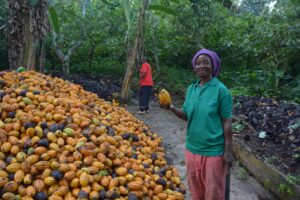Top 10 African Countries with Quality Roads

Roads play a pivotal role in the development of a place by serving as essential arteries for transportation and connectivity. They facilitate the movement of people, goods, and services, fostering economic growth and accessibility. Well-developed road infrastructure enhances connectivity between rural and urban areas, opening up trade, employment, and education opportunities. Moreover, roads are a crucial communication network component, enabling efficient transportation and reducing travel time. They connect distant regions, fostering social interactions, cultural exchange, and collaboration. The accessibility provided by roads contributes significantly to the overall progress of a community, enhancing its connectivity and playing a vital role in socio-economic development.
Talking about transportation in Africa, the main transport method is the road. That said, Africa is well known for its poor roads. But this doesn’t mean there are no African countries with quality roads. So, the question is, which are the top 10 African countries with quality roads? Continue reading this article to find out.
What is a road?
A road is a paved or unpaved thoroughfare, typically a flat surface designed for vehicular and pedestrian travel. Roads can vary in size and purpose, ranging from small, local streets to large highways and expressways. They are constructed to provide a reliable and efficient means of transportation, connecting different locations within a region. Roads are vital infrastructure for the movement of vehicles, such as cars, trucks, bicycles, and pedestrians, facilitating the flow of people and goods. Well-designed road networks are essential for economic development, trade, and overall connectivity within and between communities.
Road transport in Africa
Road transport is the most important mode of transportation in Africa, accounting for over 80% of all freight and passenger movements. The continent has a vast network of roads, but the quality of the infrastructure varies greatly from country to country. In many countries, the roads are unpaved, poorly maintained, and dangerous.
Despite the challenges, road transport plays a vital role in the African economy. It connects rural and urban areas, facilitates trade, and helps to stimulate economic growth. Road transport also provides employment for millions of people.
In recent years, there have been significant investments in improving Africa’s road infrastructure. The African Development Bank (AfDB) has committed to investing $31 billion in road transport projects over the next decade. The World Bank has also invested heavily in road projects in Africa.
These investments are helping to improve the quality of Africa’s roads, making them safer and more efficient. They are also helping to connect isolated communities and reduce poverty.
Here are some of the benefits of road transport in Africa:
- Connects rural and urban areas: Roads provide a vital link between rural and urban areas, enabling people to access markets, healthcare, and education.
- Facilitates trade: Roads are essential for transporting goods and services between countries, promoting regional trade and integration.
- Stimulates economic growth: Road transport helps to stimulate economic growth by reducing transportation costs and improving access to markets.
- Provides employment: Road transport is a major source of employment in Africa, creating jobs in construction, transportation, and logistics.
Despite the many benefits of road transport, there are also some challenges:
- Poor infrastructure: The quality of Africa’s roads varies greatly from country to country. In many countries, the roads are unpaved, poorly maintained, and dangerous.
- High transport costs: The cost of transporting goods by road in Africa is often high, due to poor infrastructure and high fuel costs.
- Safety concerns: Road accidents are a major problem in Africa, due to a number of factors, including poor road conditions, drunk driving, and speeding.
Despite these challenges, road transport is essential for Africa’s development. Investments in improving the quality of Africa’s roads are essential for reducing poverty, stimulating economic growth, and improving the lives of millions of people.
Top 10 African Countries with Quality Roads
1. Namibia: A Leader in Road Infrastructure
Namibia, with a score of 5.2 out of 7, takes the top spot in Africa for its quality roads. This achievement is reflected in its world ranking of 23. The country has been consistently investing in road infrastructure, connecting its major cities and facilitating trade. Namibia’s road network is well-maintained, allowing for smooth transportation and boosting tourism in the country.
2. South Africa: A Hub of Connectivity
South Africa, with a score of 5.0, closely follows Namibia in terms of road quality. With a world ranking of 29, South Africa has invested heavily in its road infrastructure to support its growing economy. The country’s well-connected road network has played a crucial role in promoting trade and tourism, with major cities and tourist destinations easily accessible.
3. Rwanda: Transforming Through Infrastructure Development
Rwanda, with a score of 5.0, ranks third in Africa for its quality roads. The country has made remarkable progress in rebuilding its infrastructure after the tragic events of the past. Investments in road construction have been a key focus, leading to improved connectivity within Rwanda and with neighbouring countries. This has positively impacted trade and economic development in the region.
3. Cote d’Ivoire: Connecting West Africa
Cote d’Ivoire (Ivory Coast), with a score of 4.7, ranks fourth in Africa for its quality roads. The country has invested significantly in its road infrastructure, especially in connecting the major urban centres and ports. This has boosted trade and facilitated economic growth, making Cote d’Ivoire a vital hub for West Africa.
4. Mauritius: Road Quality in Paradise
Mauritius, with a score of 4.7, shares the same ranking with Cote d’Ivoire. Despite its small size, Mauritius has prioritized the development of its road network to support its thriving tourism industry. The country’s well-maintained roads provide easy access to its stunning beaches, hotels, and other attractions, making it a popular destination for tourists.
5. Morocco: Linking Africa and Europe
Morocco, with a score of 4.4, ranks sixth in Africa for its quality roads. The country has strategically invested in its road infrastructure, connecting major cities and serving as a gateway between Africa and Europe. Morocco’s well-developed road network has played a crucial role in promoting trade and tourism, attracting visitors from around the world.
6. Kenya: Driving Economic Growth
Kenya, with a score of 4.2, ranks seventh in Africa for its quality roads. The country has made significant progress in improving its road infrastructure, particularly in connecting rural areas to urban centres. This has facilitated the movement of goods and people, stimulating economic growth and development in various sectors.
7. Botswana: Paving the Way for Progress
Botswana, with a score of 4.1, shares the eighth spot with Cape Verde in Africa’s top countries with quality roads. The country has made substantial investments in its road network, connecting its major towns and supporting its mining and tourism industries. Botswana’s well-maintained roads have contributed to its overall development and enhanced accessibility for its citizens.
8. Cape Verde: Island Connectivity
Cape Verde, with a score of 4.1, ranks alongside Botswana in terms of road quality. Despite its geographical challenges as an archipelago, Cape Verde has focused on developing its road infrastructure to connect its islands. This has facilitated trade, tourism, and transportation within the country, supporting its economic growth.
9. Senegal: Driving Progress in West Africa
Senegal, with a score of 4.0, secures the tenth spot in Africa for its quality roads. The country has made significant investments in road infrastructure, connecting its major cities and supporting its agricultural and industrial sectors. Senegal’s well-developed road network has contributed to its economic growth and enhanced regional connectivity.
10. Tunisia
Tunisia’s road quality is generally good, with a score of 3.6 points out of 7 in 2019, according to The World Economic Forum’s Global Competitiveness Report. This places Tunisia slightly below the global average of 4.07 points. However, there are some differences in road quality across the country, with the roads in coastal areas generally being better maintained than those in inland areas.
Here is a more detailed breakdown of Tunisia’s road quality:
- Quality of paved roads: 4.3 points
- Extent of paved roads: 3.9 points
- Maintenance of paved roads: 3.2 points
- Traffic congestion: 3.1 points
Tunisia has been investing in improving its road infrastructure in recent years, and this has led to some improvements in road quality. However, there is still some room for improvement, particularly in terms of maintaining paved roads and reducing traffic congestion.
Here are some of the factors that contribute to Tunisia’s road quality:
- The government’s commitment to investing in infrastructure: Tunisia has been making a concerted effort to improve its road infrastructure in recent years. This has involved investing in new roads, upgrading existing roads, and improving maintenance practices.
- The country’s geography: Tunisia has a relatively small land area and a well-developed road network. This makes it easier to maintain and upgrade roads than it would be in a larger or more mountainous country.
- The use of modern technologies: Tunisia is using modern technologies to improve road safety and efficiency. This includes the use of traffic management systems, intelligent transportation systems, and road safety cameras.
Despite the challenges, Tunisia is making progress in improving its road quality. This is good news for both businesses and tourists, as it will make it easier and safer to travel around the country.
Conclusion
Investments in road infrastructure have played a crucial role in driving economic growth and development in many African countries. The top African countries with quality roads, such as Namibia, South Africa, Rwanda, and Cote d’Ivoire, have demonstrated the positive impact of well-connected road networks on trade, tourism, and overall accessibility. As more African nations continue to prioritize infrastructure development, we can expect further advancements in road quality, enhancing connectivity and fostering economic progress across the continent.
Additional Information: The World Economic Forum’s Road Quality Index is based on surveys conducted with business leaders, providing valuable insights into the state of road infrastructure in different countries. The scores are determined by respondents’ assessments of the quality and efficiency of roads in their respective countries.





